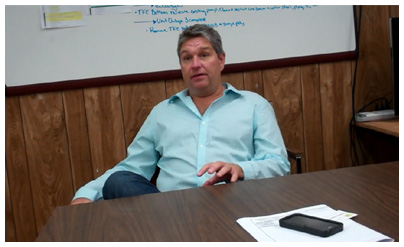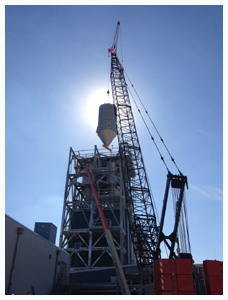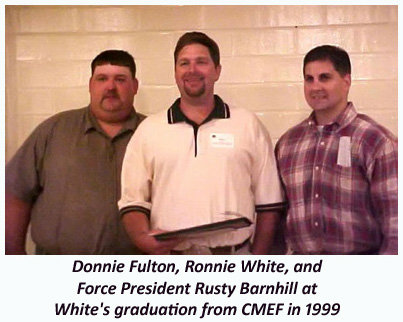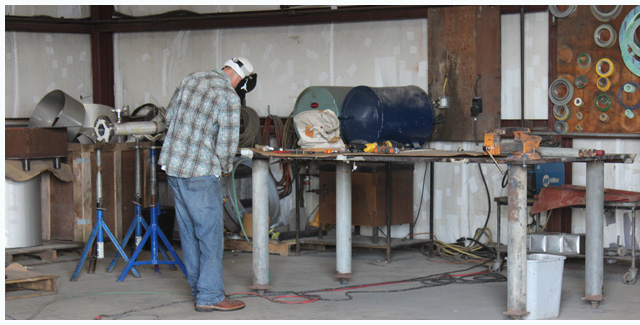 Earlier this month I visited the headquarters of Force Corporation in La Porte, Texas where I talked with project manager Ronnie White. Force is an industrial construction company that provides full service Construction, Railroad and Maintenance services in Texas and Louisiana. I asked White about his job as a project manager, where one of his responsibilities is overseeing projects. This involves him going to the worksite where he oversees the physical site and the day-to-day activities of the superintendent, the craft workers, and the helpers. He reviews and approves the workers’ time sheets, material invoices, and all other payables.
Earlier this month I visited the headquarters of Force Corporation in La Porte, Texas where I talked with project manager Ronnie White. Force is an industrial construction company that provides full service Construction, Railroad and Maintenance services in Texas and Louisiana. I asked White about his job as a project manager, where one of his responsibilities is overseeing projects. This involves him going to the worksite where he oversees the physical site and the day-to-day activities of the superintendent, the craft workers, and the helpers. He reviews and approves the workers’ time sheets, material invoices, and all other payables.
I asked about what types of craft workers Force uses on jobsites. Force employs carpenters; cement finishers; boilermakers; pipefitters; ironworkers; riggers; millwrights; welders; and equipment operators for backhoes, cranes, trackhoes, bulldozers, and specialized railroad equipment. I asked White how he began his career which has now led to his position as a project manager. He said that he started out as a construction helper and as he learned about the work, he moved up “through the ranks” until he became a project manager. White’s father and grandfather both worked in construction their entire lives, but although White knew that construction work offered opportunities for rewarding careers, he did not immediately pursue that type of work. In his words, “I got into construction kind of late – I have only been doing this for about 22 years, and right now I am almost 50.” White says he got into construction when he and his dad went to California to work in construction there. He began working as a union laborer and soon realized that he was making “pretty decent money.” A year later he was working as a carpenter building scaffolds.
I asked White how he began his career which has now led to his position as a project manager. He said that he started out as a construction helper and as he learned about the work, he moved up “through the ranks” until he became a project manager. White’s father and grandfather both worked in construction their entire lives, but although White knew that construction work offered opportunities for rewarding careers, he did not immediately pursue that type of work. In his words, “I got into construction kind of late – I have only been doing this for about 22 years, and right now I am almost 50.” White says he got into construction when he and his dad went to California to work in construction there. He began working as a union laborer and soon realized that he was making “pretty decent money.” A year later he was working as a carpenter building scaffolds.
After a few years, White returned to Texas and worked for a company that sent him to take classes from the Construction and Maintenance Education Foundation (CMEF). That training allowed him to improve his skills as a pipefitter, and he went on to be promoted to a supervisor who was in charge of other pipefitters. He has been working at Force for the past four years.
White explained to me that Force has two divisions: construction and railroad. White works in the construction division of the company. I asked what specific type of work his current team performs on the projects he oversees. He answered:
“We do civil… We do tank farms, we install the piping, we set the equipment. We actually set the tanks, set the pumps, set the exchangers. We will set everything into place and then go in and pipe it back up.”
I asked White what he would say to someone who was considering a career in construction. He answered:
“I strongly suggest it. It has gotten to the point where we need good people again. Years ago, the construction industry was strong; and now we are needing good people. There is so much work now, it’s hard to get enough quality people for the jobs. I strongly encourage people to take these classes.”
White is encouraged by the increasing number of programs now being offered in the skilled trades to high school students. We talked a little about the shift that is taking place among educators’ thinking: that a traditional college degree is not the best career path for all people, something which we have highlighted several times here on Construction Citizen. Of the previous trend to encourage all high school students to aim for college instead of the skilled trades, White said “It has hurt our industry; it really has.”
You can watch part of my conversation with White in the 2-minute video below.
Conversation with a Craftsman – Featured Craft: Pipefitter [VIDEO]
by Elizabeth McPherson | July 29, 2015


